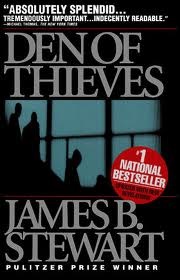
Insider trading is the trading of a public company's stock or other securities based on material, nonpublic information about the company. In various countries, some kinds of trading based on insider information are illegal. This is because it is seen as unfair to other investors who do not have access to the information, as the investor with insider information could potentially make larger profits than a typical investor could make. The rules governing insider trading are complex and vary significantly from country to country. The extent of enforcement also varies from one country to another. The definition of insider in one jurisdiction can be broad and may cover not only insiders themselves but also any persons related to them, such as brokers, associates, and even family members. A person who becomes aware of non-public information and trades on that basis may be guilty of a crime.
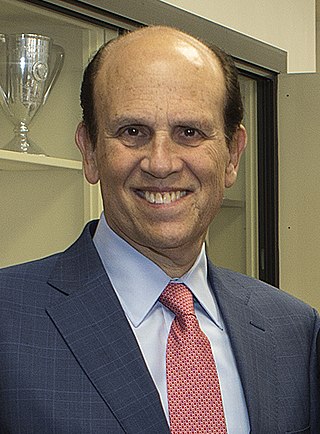
Michael Robert Milken is an American financier. He is known for his role in the development of the market for high-yield bonds, and his conviction and sentence following a guilty plea on felony charges for violating U.S. securities laws. Milken's compensation while head of the high-yield bond department at Drexel Burnham Lambert in the late 1980s exceeded $1 billion over a four-year period, a record for U.S. income at that time. With a net worth of US$6 billion as of 2022, he is among the richest people in the world.
In business, a corporate raid is the process of buying a large stake in a corporation and then using shareholder voting rights to require the company to undertake novel measures designed to increase the share value, generally in opposition to the desires and practices of the corporation's current management. The measures might include replacing top executives, downsizing operations, or liquidating the company.

A leveraged buyout (LBO) is one company's acquisition of another company using a significant amount of borrowed money (leverage) to meet the cost of acquisition. The assets of the company being acquired are often used as collateral for the loans, along with the assets of the acquiring company. The use of debt, which normally has a lower cost of capital than equity, serves to reduce the overall cost of financing the acquisition. This is done at the risk of magnified cash flow losses should the acquisition perform poorly after the buyout.
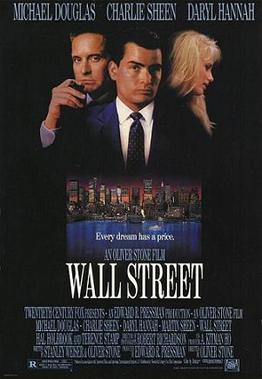
Wall Street is a 1987 American crime drama film, directed and co-written by Oliver Stone, which stars Michael Douglas, Charlie Sheen, Daryl Hannah, and Martin Sheen. The film tells the story of Bud Fox, a young stockbroker who becomes involved with Gordon Gekko (Douglas), a wealthy, unscrupulous corporate raider.
Ivan Frederick Boesky was an American stock trader known for his prominent role in an insider trading scandal in the mid-1980s. He pleaded guilty, was fined a record $100 million, served three years in prison, and became a government informant.
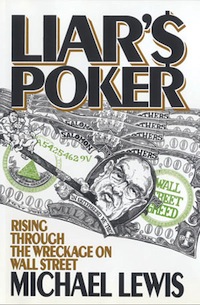
Liar's Poker is a non-fiction, semi-autobiographical book by Michael Lewis describing the author's experiences as a bond salesman on Wall Street during the late 1980s. First published in 1989, it is considered one of the books that defined Wall Street during the 1980s, along with Bryan Burrough and John Helyar's Barbarians at the Gate: The Fall of RJR Nabisco, and the fictional The Bonfire of the Vanities by Tom Wolfe. The book captures an important period in the history of Wall Street. Two important figures in that history feature prominently in the text, the head of Salomon Brothers' mortgage department Lewis Ranieri and the firm's CEO John Gutfreund.

Salomon Brothers, Inc., was an American multinational bulge bracket investment bank headquartered in New York City. It was one of the five largest investment banking enterprises in the United States and a very profitable firm on Wall Street during the 1980s and 1990s. Its CEO and chairman at that time, John Gutfreund, was nicknamed "the King of Wall Street".

Drexel Burnham Lambert Inc. was an American multinational investment bank that was forced into bankruptcy in 1990 due to its involvement in illegal activities in the junk bond market, driven by senior executive Michael Milken. At its height, it was a Bulge Bracket bank, as the fifth-largest investment bank in the United States.
James Bennett Stewart is an American lawyer, journalist, and author.
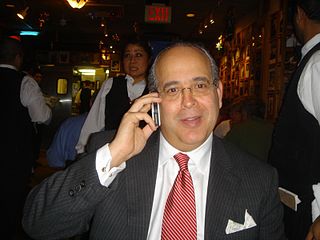
Dennis B. Levine is a corporate consultant and former investment banker. He was a managing director at the investment banking firm Drexel Burnham Lambert in the 1980s. Levine was one of the first of several high-profile insider trading defendants in the Wall Street insider trading investigations of the mid-1980s. As a result of the investigation by and subsequent proceedings, Levine pleaded guilty.
The "highly confident letter" was a financing tool created by investment bankers at Drexel Burnham Lambert, dominated by Michael Milken, in the 1980s. Its objective was to enable corporate raiders to launch leveraged buyout (LBO) offers without the debt component of their financing package fully in place.
Martin A. Siegel is an American former investment banker who was convicted, along with Ivan Boesky and Michael Milken, for insider trading during the 1980s.
John A. Mulheren Jr. was an American businessman, investor, and philanthropist.
Kidder, Peabody & Co. was an American securities firm, established in Massachusetts in 1865. The firm's operations included investment banking, brokerage, and trading.
Thomas Haskell Lee was an American businessman, financier, and investor credited with being one of the early pioneers in private equity and specifically leveraged buyouts. Thomas H. Lee Partners (THL), the firm he founded in 1974, is among the oldest and largest private equity firms globally. At the time of his death, he was the managing partner of Lee Equity Partners, a private equity firm he founded in 2006 after leaving Thomas H. Lee Partners. According to Forbes, he had a net worth of $2 billion at the time of his death.

The history of private equity, venture capital, and the development of these asset classes has occurred through a series of boom-and-bust cycles since the middle of the 20th century. Within the broader private equity industry, two distinct sub-industries, leveraged buyouts and venture capital experienced growth along parallel, although interrelated tracks.

Private equity in the 1990s relates to one of the major periods in the history of private equity and venture capital. Within the broader private equity industry, two distinct sub-industries, leveraged buyouts and venture capital, experienced growth along parallel although interrelated tracks.

Barbarians at the Gate: The Fall of RJR Nabisco is a 1989 book about the leveraged buyout (LBO) of RJR Nabisco, written by investigative journalists Bryan Burrough and John Helyar. The book is based upon a series of articles written by the authors for The Wall Street Journal. The book was made into a 1993 made-for-TV movie by HBO, also called Barbarians at the Gate. The book centers on F. Ross Johnson, the CEO of RJR Nabisco, who planned to buy out the rest of the Nabisco shareholders.
Terren Scott Peizer is an American businessperson. On June 21, 2024, he was found guilty by a California federal jury of three counts of insider trading and securities fraud, following a nine-day trial. Peizer faces a maximum penalty of 65 years in prison.
